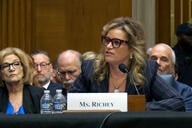You have /5 articles left.
Sign up for a free account or log in.
I am not hopeful.
When I post in this space, I sometimes get comments or emails from people who see things similarly, expressing gratitude for remaining “hopeful” despite the challenges facing education.
It’s interesting that taking the time to publicly advocate for my personal values and the things I believe to be true are viewed as expressions of hope, but I do not see them this way.
I actually have very little belief that the things I value – reasonable access to undergraduate education conducted at a person to person scale – will be maintained in a meaningful way for anyone other than the already privileged and a handful of lucky few who are let through the gates.
I need go no further than Inside Higher Ed’s daily Quick Takes to find some depressing higher education news of messed-up priorities. Just yesterday I learned that the president of the University of Akron is benefiting from a $950K reno[1] on his university-supplied home, even as 200 employees were laid off, including everyone associated with their highly regarded university press.
Or how about the news that Purdue University, a public institution, will now have a majority of out of state students? A free-market success, I suppose. At what cost? I wonder.
So when I write about the intellectually dishonest think-tank nonsense claiming that universities are illusions and will be replaced with “everywhere,” or that it’s important to try to preserve “mind-blowing” experiences for students, it’s not because I think the things I value have a chance against the opposition.
When it comes to education, that opposition includes both major political parties. The think thank that supports the neoliberal “New American University” where teaching faculty are disposable and students are to be educated by algorithm is supported by the Democratic party donor base.
Those groups will tell you that their vision for the future is necessary given that many states are heading towards zeroing out their contributions to public higher education, and they’re not wrong, except that this highlights how the voices championing the values I believe in, public education as a public good, are far from being concerns for those in proximity to the levers of power[2].
I believe treating education as a business, as we have been doing, and will continue to do for the foreseeable future, has been very bad for education, and not particularly good business either.
So no, I am not hopeful. When it comes to believing that we might see significant systemic change in how we view education and treat educators, call me a cynic.
I respect it in others, but for me, to hope is to lie, and I try not to lie.
--
I do not despair.
I think it is a mistake to believe that the opposite of hope must be despair.
I have been rereading Ta-Nehisi Coates’ new book Between the World and Me in light of a series of essays on the book by the scholar Tressie McMillian Cottom. The final installment addresses criticisms of the book. Prof. Cottom identifies one strain as those – primarily white – readers who are bothered by Coates’ so-called “hopelessness." We see it in Rich Lowry’s review, in which he labels Coates’ world view “toxic.”
I was not bothered by Coates’ supposed “hopelessness” because to me, the book is an effort to convey his own truths, and that effort is apparent. As a work of artistry it is beyond reproach.
A similar attitude is found in the work of the man often identified as the most significant forbearer to Ta-Nehisi Coates, James Baldwin. Baldwin always stood apart from other activists of the Civil Rights era because he was more artist than activist. He was not going to tell a lie. He was not in the hope business.
Baldwin wanted to believe that change was possible, but he also named his most celebrated work of non-fiction, The Fire Next Time, after an old spiritual that offered God’s warning:
God gave Noah the rainbow sign,
no more water the fire next time
Baldwin’s prophecy has been received by Coates, and Coates has engaged in his own witnessing, a witnessing of the self and the world around him. If we are going to discount the message, we must also disbelieve the testimony, and there is no reason to do so.
Readers and critics seem disturbed by this, that hopelessness must mean we live in an irreconcilable and irredemable world.
But why must we cling to the notion that the world may be redeemed? What good has this done? I’m wondering if hopelessness is the first requirement of progress.
If I cannot hope, and I do not wish to embrace despair, what am I left with?
The work. I have the work. Teaching. Writing.
One of the reasons I defend the values that I think are important to education is because I have seen them making a difference to students. I know this matters to those people, the trajectories of individual lives have been changed.
I have no faith that enough individual trajectories are changed to alter the course of the world. I don’t carry that kind of hope.
But as my artistic betters prove, witnessing matters. I’m going to keep doing it.
Just don’t confuse it with hope.
[1] Including a special suite for the president’s in-laws.
[2] There are some green shoots in the form of projects like Sara Goldrick-Rab’s Wisconsin Hope Lab, which has seen some concrete successes in attacking the problems of affordability.

